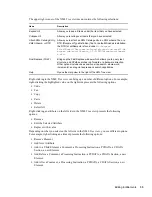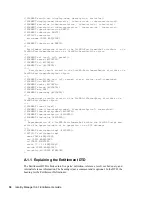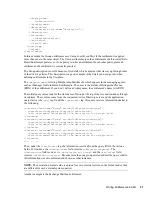
Creating Policies to Support Entitlements
5
27
no
vd
ocx
(e
n)
13
Ma
y 20
09
5
Creating Policies to Support
Entitlements
An entitlement gives a user permission to access the resource represented by the entitlement.
However, for the entitlement to actually be granted or revoked, you need to create the appropriate
policies.
Information about how to create policies is provided in the
Policies in Designer 3.0
(http://
www.novell.com/documentation/idm36/policy_designer/data/bookinfo.html)
and
Policies in
iManager for Identity Manager 3.6.1
(http://www.novell.com/documentation/idm36/
policy_imanager/data/bookinfo.html)
guides.
By default, the Active Directory driver includes several entitlements and the policies required to
support the entitlements. These policies are listed below. You can use these policies as examples of
the types of policies you might need to create to support entitlements on other drivers.
Input Transform (driver level):
The Check Target Of Add Association For Group
Membership Entitlements rule in this policy checks the target of “add-association” for group
membership entitlements. Group membership entitlements assigned to users being created in
Active Directory cannot be processed until the user is successfully created. Add-association
signals that an object has been created by the driver in Active Directory. If the object is also
tagged for group entitlement processing, it performs the work now.
Event Transform (Publisher channel):
The Disallow User Account Delete rule in this policy
disallows a user account delete in the Identity Vault. When you use the User Account
Entitlement, managed user accounts are controlled by the entitlement in the Identity Vault. A
delete in Active Directory does not delete the controlling object in the Identity Vault. A future
change to the object in the Identity Vault or a merge operation might re-create the account in
Active Directory.
Command (Subscriber channel):
The Command policy contains the following rules
pertaining to entitlements:
The User Account Entitlement Change (Delete Option) rule. The User Account
Entitlement grants the user an enabled account in Active Directory. Revoking the
entitlement disables or deletes the Active Directory account, depending on the value you
select for the
When account entitlement revoked
global variable. This rule executes when
the entitlement is changing and you have selected the
Delete
option.
The User Account Entitlement Change (Disable Option) rule. The User Account
Entitlement grants the user an enabled account in Active Directory. Revoking the
entitlement disables or deletes the Active Directory account, depending on the value you
select for the
When account entitlement revoked
global variable. This rule executes when
the entitlement is changing and you have selected the
Disable
option.
The Check User Modify for Group Membership Being Granted or Revoked rule.
The Check User Modify for Exchange Mailbox Being Granted or Revoked rule.
Matching (Subscriber channel):
This is the Account Entitlement: Do Not Match Existing
Accounts rule for this policy. When you use the User Account entitlement with the Identity
Manager user application or Role-Based Entitlements, accounts are created and deleted (or
disabled) by granting or revoking the entitlement. The default policy does not match an existing
Summary of Contents for IDENTITY MANAGER 3.6.1 - ENTITLEMENTS
Page 4: ...4 Identity Manager 3 6 1 Entitlements Guide novdocx en 13 May 2009...
Page 6: ...6 Identity Manager 3 6 1 Entitlements Guide novdocx en 13 May 2009...
Page 8: ...8 Identity Manager 3 6 1 Entitlements Guide novdocx en 13 May 2009...
Page 12: ...12 Identity Manager 3 6 1 Entitlements Guide novdocx en 13 May 2009...
Page 26: ...26 Identity Manager 3 6 1 Entitlements Guide novdocx en 13 May 2009...
Page 44: ...44 Identity Manager 3 6 1 Entitlements Guide novdocx en 13 May 2009...
















































